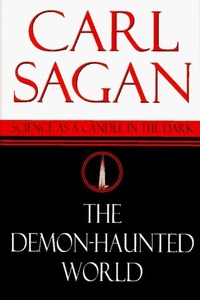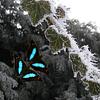Take a photo of a barcode or cover
A reading of The Demon-Haunted world in 2023 perhaps falls victim to the book's very success. Its monumental influence in the nascent skeptic internet culture makes itself felt as every anecdote of delusional believers and motivated flim-flam artists Sagan recounts now comes across trite and well-worn, even though, in their contemporary context, they may have been perfectly topical slam dunks. This excess familiarity is little helped by Sagan's languid, overly-conversational tone, which inevitably encourages the reader to flit from paragraph to paragraph in search of some kernel of novelty.
I hate to say it, but the busy reader might benefit from limiting themselves to diving no deeper than the introduction's cautionary prognostication about the dangers of societal backsliding toward credulous superstition.
I hate to say it, but the busy reader might benefit from limiting themselves to diving no deeper than the introduction's cautionary prognostication about the dangers of societal backsliding toward credulous superstition.
A cri de ceour in favor of the scientific method, and completing the Enlightenment's haphazard hold on our culture!! I CAST THEE OUT, DARK SHADOWS OF AUTHORITARIANISM AND WOO!
In a way, this book is a spiritual ancestor of Conspirituality, another book that covers similar themes of anti-scientific social ape nonsense and its ramifications throughout society and politics - though in the post-Covid age.
THIS book, by the very lauded Carl Sagan, is, in many ways, a very 90s book. So I actually struggled through the first half of it. I would rate the first half 2 stars (!). But I just cannot tolerate chapter upon chapter of garbage - and Sagan spends MANY chapters debunking UFOs, crop circles, the X-Files (!), and other super outdated 90s woo. He then spends a fiery chapter on Medieval witch hunts, and his clear-eyed assessment of them as expressions of patriarchal power and control, chef's kiss. But then it's back to alien abduction stories. Mannnn...
I mean. I guess his argument is that humans' capacity to engage in woo is (a) directly tied to our social ape ancestry, and thus (b) TIMELESS. Oh, how I wish he had lived miraculously until now - so he could lock arms with Tony Fauci and fight the forces of anti-vax fear-mongering. Because, indeed, 1995 Sagan predicts 2025 America dismally well. And his tight linking of Enlightenment ideals - the scientific method AND "liberte, egalite, fraternite" (aka social justice) - was just, mwah, so heartening. Thank you!! We must bang this drum again and again and again!!!
Indeed, the second half of the book was much more exciting - and got me very amped up. He circles back to witch hunts (damn the patriarchy!), laments education and the cultural caricatures of scientists (mad scientists, nerds, etc), ponders the link between literacy/education and civic empowerment and democracy, and - single tear - envisions various utopian scenarios of e.g. our political leaders being intelligent and informed and comfortable with uncertainty. SOB.
By the end, I was:
- Ready to re-read Ted Miguel's research on modern witch hunts (and how they occur more often during periods of food insecurity...): http://emiguel.econ.berkeley.edu/research/poverty-and-witch-killing/
- PUMPED to dust off all my pop quantum mechanics books so I could go "whoooooa"
- PUMPED to read about "scientism" as well (sorry, Carl!!!)
In a way, this book is a spiritual ancestor of Conspirituality, another book that covers similar themes of anti-scientific social ape nonsense and its ramifications throughout society and politics - though in the post-Covid age.
THIS book, by the very lauded Carl Sagan, is, in many ways, a very 90s book. So I actually struggled through the first half of it. I would rate the first half 2 stars (!). But I just cannot tolerate chapter upon chapter of garbage - and Sagan spends MANY chapters debunking UFOs, crop circles, the X-Files (!), and other super outdated 90s woo. He then spends a fiery chapter on Medieval witch hunts, and his clear-eyed assessment of them as expressions of patriarchal power and control, chef's kiss. But then it's back to alien abduction stories. Mannnn...
I mean. I guess his argument is that humans' capacity to engage in woo is (a) directly tied to our social ape ancestry, and thus (b) TIMELESS. Oh, how I wish he had lived miraculously until now - so he could lock arms with Tony Fauci and fight the forces of anti-vax fear-mongering. Because, indeed, 1995 Sagan predicts 2025 America dismally well. And his tight linking of Enlightenment ideals - the scientific method AND "liberte, egalite, fraternite" (aka social justice) - was just, mwah, so heartening. Thank you!! We must bang this drum again and again and again!!!
Indeed, the second half of the book was much more exciting - and got me very amped up. He circles back to witch hunts (damn the patriarchy!), laments education and the cultural caricatures of scientists (mad scientists, nerds, etc), ponders the link between literacy/education and civic empowerment and democracy, and - single tear - envisions various utopian scenarios of e.g. our political leaders being intelligent and informed and comfortable with uncertainty. SOB.
By the end, I was:
- Ready to re-read Ted Miguel's research on modern witch hunts (and how they occur more often during periods of food insecurity...): http://emiguel.econ.berkeley.edu/research/poverty-and-witch-killing/
- PUMPED to dust off all my pop quantum mechanics books so I could go "whoooooa"
- PUMPED to read about "scientism" as well (sorry, Carl!!!)
hopeful
informative
inspiring
reflective
medium-paced
Some aspects are still relevant today as (especially near the end of the book) Carl Sagan addresses some things that are happening today.
I like how he does not totally revere science, but knows that it too has its faults. But as science uses experiments/research to question hypotheses, it is a bit easier to adapt to new ideas.
All in all, I really enjoyed this book and I hope I will use (keep using) sceptical thinking, even though I sometimes wander into the non-scepticalism ;)
I like how he does not totally revere science, but knows that it too has its faults. But as science uses experiments/research to question hypotheses, it is a bit easier to adapt to new ideas.
All in all, I really enjoyed this book and I hope I will use (keep using) sceptical thinking, even though I sometimes wander into the non-scepticalism ;)
challenging
hopeful
informative
inspiring
reflective
slow-paced
informative
reflective
medium-paced
informative
reflective
medium-paced
informative
reflective
medium-paced
não esperava tamanho foco em aliens mas aí a culpa é minha de não ter pesquisado antes
It's cool having Goodreads to track my reading because it can give me an honest view of my reading habits. If I'm not super intentional about them, I can really fall off the wagon. It took me 3 months to read this book! Now, I'm going to blame a lot of things such as the fascist coup our country is undergoing and the falling apart of the second bookclub I've been apart of. It's easier to stay on track when others are keeping you accountable. Also though, this was a denser book. Mr. Sagan is an absolute genius and also not a particularly efficient writer.
With that being said, the ideas are indispensable and I'll be keeping this one on my bookshelf for years to come and I genuinely think I may end up revisiting it, or at least pieces of it. The last third of the book gets really political in a way that Sagan takes pains to avoid the first two thirds. He becomes impassioned by the idea that scientific literacy and skeptical thinking are foundational to a functioning democracy. He empathizes with activists and journalists and expresses his concerns about the educational standards of America, and the literacy levels of its population. It's frightening to see how the problems he was decrying in the 90s have only worsened in the 30 years since. Or at least if there were positive steps forward there were more definitive steps backward. He did convince me of his case though, and I'm going to make it a life goal to become more scientifically literate and to foster that same literacy in my daughter. Hopefully eventually I'll feel like I can help to facilitate growth in these areas in a wider circle of community as well.
Stay skeptical friends, and stay free.
With that being said, the ideas are indispensable and I'll be keeping this one on my bookshelf for years to come and I genuinely think I may end up revisiting it, or at least pieces of it. The last third of the book gets really political in a way that Sagan takes pains to avoid the first two thirds. He becomes impassioned by the idea that scientific literacy and skeptical thinking are foundational to a functioning democracy. He empathizes with activists and journalists and expresses his concerns about the educational standards of America, and the literacy levels of its population. It's frightening to see how the problems he was decrying in the 90s have only worsened in the 30 years since. Or at least if there were positive steps forward there were more definitive steps backward. He did convince me of his case though, and I'm going to make it a life goal to become more scientifically literate and to foster that same literacy in my daughter. Hopefully eventually I'll feel like I can help to facilitate growth in these areas in a wider circle of community as well.
Stay skeptical friends, and stay free.
Library hold expired and i wasnt invested enough to continue


